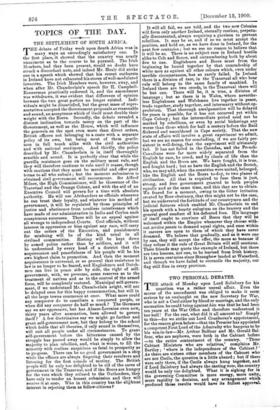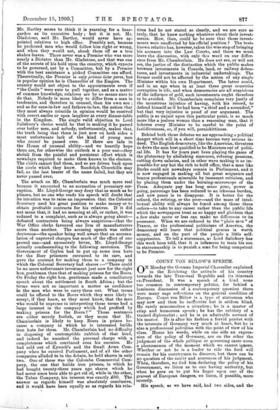TWO PERSONAL DEBATES. T HE attack of Monday upon Lord Salisbury
for his nepotism was a rather unreal affair. Even the mover of the amendment was obliged to make it seem serious by an onslaught on the new Secretary for War, who is not a Cecil either by blood or marriage, and the only accusation he could bring against hint was that he had been ten years at the War Office and therefore understood it too well! For the rest, what did it all amount to? Simply to this—for we strike out Lord Cranborne's appointment, for the reason given below—that the Premier has appointed a competent First Lord of the Admiralty who happens to be his son-in-law—Mr. Arthur Balfour and Mr. Gerald Bal- four, who are nephews, were both in the Cabinet before —to the entire contentment of the country. Three Cabinet Ministers who are relatives,' complains Mr. Bartley ; where is the independence of the Cabinet ? ' As there are sixteen other members of the Cabinet who are not Cecile, the question is a little absurd ; but if there were only three, if the Cecile always hung together, and if Lord Salisbury had always the casting vote, the country would be only too delighted. What it is sighing for in the governing Committee is more energy, more unity, more rapidity in decision, and any arrangement which produced those results would have its fullest approval. Mr. Bartley seems to think it is yearning for a bear- garden as its executive body ; but it is not. Mr. Gladstone, said Mr. Bartley, would never have ap- pointed relatives to high office. Possibly not, because he preferred men who would follow him right or wrong, and when they would not, shook them off as a tree shakes leaves. There never was a Premier who was more nearly a Dictator than Mr. Gladstone, and that was one of the secrets of his hold upon the country, which expects to be governed, not by a Committee, but by a Premier with the best assistance a, picked Committee can afford. Theoretically, the Premier is only prinzus inter pares, but in popular opinion he is Chancellor of the Empire. The country would not object to the appointments even if "the Cecils " were sure to pull together, and as a matter of common knowledge, relatives are by no means sure to do that. Nobody is more likely to differ from a man in tendencies, and therefore in counsel, than his own son ; and as for sons-in-law and fathers-in-law, the notion that they must always coincide in opinion would be received with covert smiles or open laughter at every dinner-table in the Kingdom. The single valid objection to Lord Salisbury's choice would be that in making it he passed over better men, and nobody, unfortunately, makes that, the truth being that there is just now on both sides a most unfortunate lack of the kind of young men who cannot be passed over. If there are lads in the House of unusual ability—and we heartily hope there are, for otherwise the outlook is a poor one—they shrink from the painful and persistent effort which is nowadays required to make them known to the electors. The chiefs cannot find them, and so are driven back upon the circle which they know. Randolph Churchills may fail, as the last bearer of the name failed, but they are never passed over.
The attack on Mr. Chamberlain was much more real because it amounted to an accusation of pecuniary cor- ruption. Mr. Lloyd-George may deny that as much as he pleases, but no one who reads his speech will doubt that its intention was to raise an impression that the Colonial Secretary used his great position to make money or to obtain profitable contracts for his relatives. If it did not mean that, it had no meaning at all, or rather, it was reduced to a complaint, such as is always going about— defeated contractors being always suspicious—that the War Office clerks favoured one firm of manufacturers more than another. The accusing speech was rather dexterous—the speaker being well aware that an accumu- lation of unproved charges has much of the effect of one proved one—and excessively bitter, Mr. Lloyd-George actually condescending to the following sentences. The Government of Ceylon had to put up some iron huts for the Boer prisoners entrusted to its care, and gave the contract for making them to a company in which the Colonial Secretary had shares :—" There could be no more unfortunate investment just now for the right hon. gentleman than that of making prisons for the Boers. On Friday the right hon. gentleman made a conciliatory speech about the settlement in South Africa ; but the terms were not so important a matter as confidence in the men who were to carry them out. What terms could be offered to the Boers which they were likely to accept, if they knew, as they must know, that the man who would be supreme in interpreting those terms had a large interest in the company which had profited by making prisons for the Boers ?" Those sentences are either merely foolish, or they mean that Mr. Chamberlain is likely to keep Boers in prison be- cause a company in which he is interested builds iron huts for them. Mr. Chamberlain had no difficulty in disposing of contemptible rubbish of that kind, and indeed he smashed the personal charge with a completeness which convinced even his enemies. He had sold. out of Kynoch's and the Small Arms, Com- pany when he entered Parliament, and of all the other companies alluded to in the debate, be held shares in only two. One of these was the Colombo Commercial Com- pany, the one that builds iron prisons, in which he had bought twenty-three years ago shares which he had never since been able to get rid of, while in the other, the Tubes Company, his interest was exactly £60. The answer as regards himself was absolutely conclusive, and it would have been equally so as regards his rela- tives had he not stated so clearly, and we are sure so truly, that he knew nothing whatever about their invest- ments. How, then, could he be sure that those invest- ments were unaffected by his official position ? The best- known relative has, however, taken the wise step of bringing his accusers into the Law Courts, and there we must leave the discussion, with only this word on our differ- ence from Mr. Chamberlain. He does not see, or will not see, the justice of the distinction which the public makes between investments in Consols, land, or railway deben- tures, and investments in industrial undertakings. The former could not be affected by the action of any single Minister within his own Department. The latter could, and in an age when in at least three great countries corruption is rife, and when democracies are all suspicious of the influence of gold, such investments ought therefore to be avoided. Mr. Chamberlain complains very justly of the monstrous injustice of having, with his record, to defend himself as if he had been "a thief and a scoundrel," but that very injustice is proof of our argument. The public is so unjust upon this particular point, is so much more like a jealous woman than a reasoning man, that it behoves every Minister to be careful to the point of fastidiousness, or, if you will, pernickittiness.
Behind both these debates we see approaching a political danger which will in a short time become very serious in- deed. The English democracy, like the American, threatens to drive the men best qualified to be Ministers out of politi- cal life. It has for years past been playing the game of the plutocracy by abolishing sinecures, refusing pensions, cutting down salaries, and in other wave making it so im- possible for any but the rich to hold office, that a man like Burke could not nowadays remain in Parliament, and it is now engaged in making all but great seigneurs and brazen professionals miserable by incessant criticism, and by placing them under the burning-microscope of the Press. Adequate pay has long since One, power is going, patronage has been reduced to an irksome burden, and now peace is to disappear. It is better for the refined, the retiring, or the poor—and the mass of intel- lectual ability will always be found among those three orders—to take to any career rather than the public life which the newspapers treat as so happy and glorious that a few stabs more or less can make no difference to its possessor. When we are reduced to the " plain men " of France, or the professional politicians of America, the democracy will learn that political genius is worth money, and on the part of the people a little self- suppression. To tell a statesman, as Lord Salisbury has this week been told, that it is infamous to train his son in statesmanship is to punish a. man for being competent to be Premier.















































 Previous page
Previous page